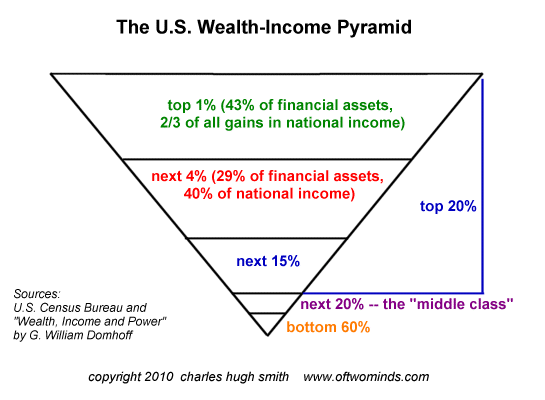→ Hues of Context
Fatally Flawed Approaches to the Budget Deficit and Taxes;
Debt Will Swell
Under 3 of 4 Republican Hopefuls'
Tax Plans
↓
The Corruption of America
↓

Debt Will Swell
Under 3 of 4 Republican Hopefuls'
Tax Plans
↓
The Corruption of America
↓

Money is a disease, power an affliction.*
Where you're coming from determines what you'll see, and who you are
shapes your perception. I agree with the broad outlines of
Stansberry's argument, but question some of his assumptions and many
of the conclusions found within the article at the second link
above. The first assumption I take issue with is a certain
unenlightened disinterest in vogue with reactionary polemicists'
arguments for the elimination of progressive taxation. Ironically this is a
seamless fit with the general theme of “entitlement” as the source
of widespread corruption in America.It is routinely alleged in national political debates that something is fundamentally unfair and un-American about the huge "wealth gap" between the poorest Americans and the wealthiest. Some politicians like to argue that the poor never have a real shot at the American dream, and as a nation, we owe them more and more of our resources to correct this injustice. Most important, it is alleged that only the government has the resources to correct this inequality.
This is a dangerous notion...
First, it promotes the idea of entitlement. Entitlement is a fairly new idea in the American political lexicon – perhaps because most of our nation's wealth is still fairly new. The American idea of entitlement argues that because you were born into a rich society, other people owe you something. The idea has become pervasive in our culture. It underlies the basic assumptions behind the idea of a "wealth gap." Implicit is the assumption that successful Americans haven't rightfully earned their wealth... that in one way or another, they've taken advantage of the society and have an obligation to give back most of what they've "taken."
 |
| When Things Fall Apart: Disorientation, Desperation, Chaos |
Which is more dangerous, a society that owes some obligation to its poorest quarters, or one that sees human relations through the perverse lens of social Darwinism and laissez faire laws of an economic jungle red in tooth and claw? This inquiry is not meant to imply that there isn't tremendous waste and misdirection within this nation's redistribution of wealth, but it should highlight the contradiction embodied by politicians who wax disingenuous and smarmy about Christian heritage while denying fealty or responsibility for those less favored by inheritance and fate.
Concerning this nation's wealth: from where – exactly – was it derived? Haven't we, as a nation, been the principle extractor of resources from other lands, secured through the barrels of our guns and and the heels of our boots when simple bribery would not suffice? Isn't our legacy of international affairs one stained by our own corruption and greed wedded to and supported by an old-world racism that lingers still in today's fetid and putrescent politics? Entitlement is not a new phenomenon of the American experience. Manifest destiny entitled us to this continent, racism gave us the worst imaginable license over our "darker brothers" and "the white man's burden" purchase to our hemisphere and the far flung possessions of the fading Spanish Crown. This short enumeration excludes the industrialized ravages our country inflicted in the last century, so it is a fairly stark and ahistorical fallacy to suggest that "entitlement" is a recent scourge on our moral foundation. What is new, since The New Deal and The Great Society programs of the last century, is that more people were sharing in the wealth of this nation – stolen or not.
Don't successful Americans benefit disproportionately from our public institutions and infrastructure? Isn't the vast economic landscape whereon they succeed supported in some measure by the taxes we all pay and the broader social compact that maintains civil society? It is a greedy and selfish ethos that wants to deny a greater responsibility for the greater rewards earned in this environment. Entitlement? You betcha.
We have always been a nation of men pretending the the law to be our master. Freedom and equality by definition stand in opposition and the role of our government had been to moderate that contest of archetypal wills. The American government's sole purpose today seems to be protecting the connections between the wealthy and the powerful from all responsibility and account. It works, id est, until it doesn't.
* Notes on the “colorized” image
The colors blue and red, respectively, for Democratic and Republican
administrations follow a near uniform association reinforced by visual
media. In addition to executive branch demarcation by party seven lines
and a shading differential signify historic events. Left to right in
chronological order they are- black line for the November 1963 assaassination of President Kennedy
- yellow line indicating the closing of the gold window by President Nixon in August 1971
- shading change for the August 1975 resignation of President Nixon
- gray line for the beginning of President G.H.W. Bush's term in 1988
- red line marking the 1994 Republican majority in The U.S. House of Representatives
- black line for September 11, 2001
- blue line marking the 2006 Democratic majority in The U.S. House of Representative
- red line marking the 2010 Republican majority in The U.S. House of Representatives
No comments:
Post a Comment